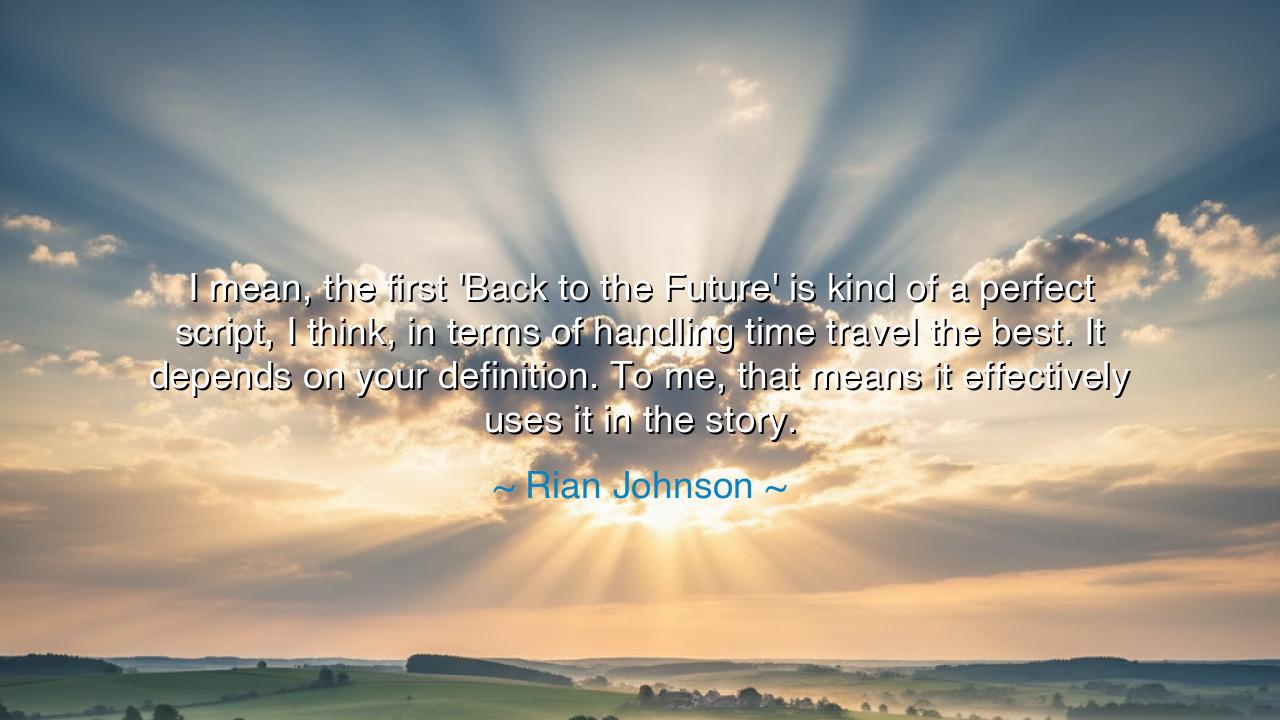
I mean, the first 'Back to the Future' is kind of a perfect
I mean, the first 'Back to the Future' is kind of a perfect script, I think, in terms of handling time travel the best. It depends on your definition. To me, that means it effectively uses it in the story.






Rian Johnson, the storyteller of our age, once reflected on the craft of narrative, saying: “I mean, the first ‘Back to the Future’ is kind of a perfect script, I think, in terms of handling time travel the best. It depends on your definition. To me, that means it effectively uses it in the story.” In these words, he reveals not only his admiration for a film, but a timeless truth about art, structure, and the power of an idea when wielded with clarity. He does not speak only of cinema; he speaks of the essence of all creation—that beauty lies not in complication, but in how elegantly an idea is woven into the fabric of story.
The first heart of his statement is the praise of a perfect script. What does it mean for a script to be perfect? It is not to say that it contains no flaw, but that every element serves its purpose, every line, every event, every choice interlocks like gears in a grand clock. In the case of ‘Back to the Future’, Johnson recognizes that its perfection lies in how time travel is not decoration, not spectacle alone, but the very heartbeat of the tale. The past and the future, the choices of fathers and the courage of sons, become threads of destiny woven tightly together.
He also names the importance of definition. What is “best” in a story? Some may say it is spectacle, others say it is logic, others say it is heart. Johnson’s wisdom is that one must first define what matters. For him, it is the effective use of the concept—does the device serve the story, or does the story serve the device? In ‘Back to the Future’, the answer is clear: time travel is not an ornament; it is the loom upon which the entire narrative is woven. Thus, he teaches us that greatness lies in harmony between idea and purpose.
The ancients knew this truth, though they spoke not of films but of epics. Homer, in the Iliad, used the wrath of Achilles not as mere spectacle but as the central thread that bound gods and men together. Virgil, in the Aeneid, employed the destiny of Rome not as background, but as the structure that shaped every trial of Aeneas. In the same way, Johnson honors ‘Back to the Future’ because it did what the greatest works always do: it took a grand concept—time travel—and made it inseparable from the human story at its core.
Consider, too, the contrast with works that falter. How many tales have dazzled with spectacle, yet left the heart untouched? How many stories wield great ideas but fail to bind them to character and meaning? These are like monuments of marble without foundation—grand in sight, yet hollow and forgettable. Johnson’s admiration reminds us that true mastery lies not in how grand the idea is, but in how deeply it is woven into the soul of the tale.
Thus, the origin of his words lies in reverence for craftsmanship. Rian Johnson himself, a maker of complex narratives like Looper and Knives Out, understands that ideas are tools, not masters. He sees in ‘Back to the Future’ a shining example of balance: the science of time travel is entertaining, but more importantly, it is essential to Marty’s growth, to his family’s redemption, to the triumph of courage over despair. That is why he calls it “perfect.”
The lesson for us is this: in whatever we create—be it stories, art, work, or even our lives—we must not be distracted by spectacle alone. It is not the size of our idea that gives it power, but how well it serves the whole. Like the script Johnson praises, let every part of our life and labor fit into a greater design, so that nothing is wasted, and all serves purpose.
Practical counsel follows: when you build—whether a story, a career, or a dream—ask yourself: is every piece connected to the heart of the whole? Do not pursue grandeur for its own sake, but seek harmony, clarity, and truth. For it is not the loudest tale that endures, but the one in which every element sings together in unity. And if you can achieve this, as ‘Back to the Future’ did with time travel, then your work, too, will stand as “perfect” in the eyes of generations to come.






AAdministratorAdministrator
Welcome, honored guests. Please leave a comment, we will respond soon